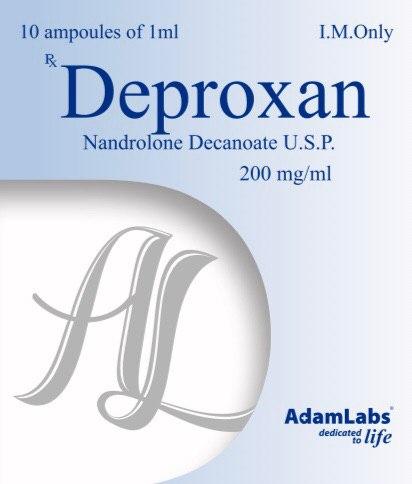
Indications And Clinical Uses: As adjunctive therapy in senile and postmenopausal osteoporosis. Anabolic steroids are without value as primary therapy but may be of value in adjunctive therapy. Equal or greater consideration should be given to diet, calcium balance, physiotherapy and good general health promoting measures, in pituitary dwarfism anabolic agents may be used with care until growth hormone is more available.
This product is also useful in treatment of those conditions in which a potent tissue building or protein sparing action is desired. Its principal uses are to induce weight gain and well being by virtue of its anabolic action. Such therapy is most effective when combined with a good dietary regimen. Anabolic effects have been demonstrated in chronic disease and convalescence, debility states, inoperable mammary carcinoma, corticoid induced catabolic states, myopathies, decubitus ulcers, burns and as adjuvant therapy of certain types of anemia (aplastic, sickle cell). It should be used only after diagnosis is established.
Contra-Indications: Hypersensitivity to Deproxan. Male patients with carcinoma of the prostate, breast.
Pregnancy: Pregnancy, because of possible masculinization of the fetus.
Nephrosis or the nephrotic phase of nephritis. Cardio-renal failure. Liver disease with impaired bilirubin excretion.
Manufacturers’ Warnings In Clinical States: Caution in patients with cardiac, renal or hepatic disease.
Precautions: If amenorrhea or menstrual irregularities develop the drug should be discontinued until the etiology is determined.
Anabolic steroids may increase sensitivity to oral anticoagulants.
Dosage of the anticoagulant may have to be decreased in order to maintain the prothrombin time at the desired therapeutic level.
Anabolic steroids have been shown to alter glucose tolerance tests. Diabetics should be followed carefully and the insulin or hypoglycemic dosage adjusted accordingly.
Anabolic steroids should be used with caution in patients with benign prostatic hypertrophy.
Serum cholesterol may increase or decrease during therapy. Therefore, caution is required in administering these agents to patients with a history of myocardial infarction or coronary artery disease. Serial determinations of serum cholesterol should be made and therapy adjusted accordingly.
Hypercalcemia may develop both spontaneously and as a result of hormonal therapy in women with disseminated breast carcinoma. If it develops while on this agent, the drug should be stopped.
Signs of masculinization which have been produced by testosterone therapy in women have ranged from mild acne, hoarsening of the voice and an increase in or darkening of the hair of the face. Women and children under seven years of age are more sensitive to androgen therapy. Deproxan, which is far less androgenic than testosterone, has not produced these signs when given in the recommended doses, save for a few of the milder of these effects. As is common with other steroids of this class, it may be possible with large doses or intensive treatment during the first half of the menstrual cycle to inhibit menses; however, with recommended doses, menses are not apt to be disturbed.
Pregnancy: Should not be used in pregnant women.
Use of anabolic steroids by athletes is not recommended.
Adverse Reactions:
Included in this listing are a few adverse reactions not reported with this specific drug. However, pharmacological similarities among the anabolic steroids require that each reaction be considered when Deproxan is prescribed.
Virilization is the most common undesirable effect associated with anabolic steroid therapy.
In males: Prepubertal: phallic enlargement, increased frequency of erections.
Postpubertal: inhibition of testicular function, testicular atrophy, and oligospermia, impotence, chronic priapism, gynecomastia; and epididymitis and bladder irritability.
